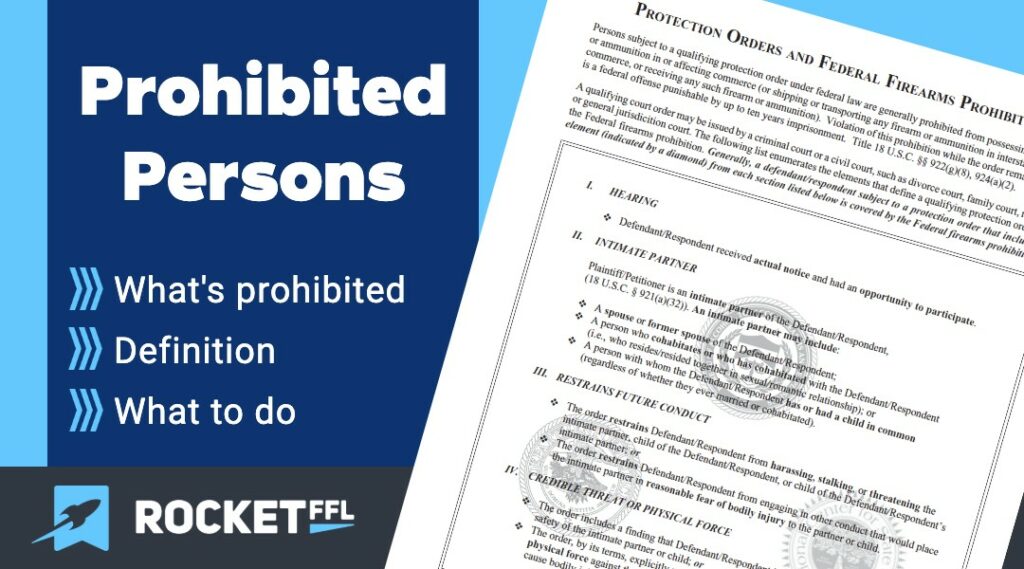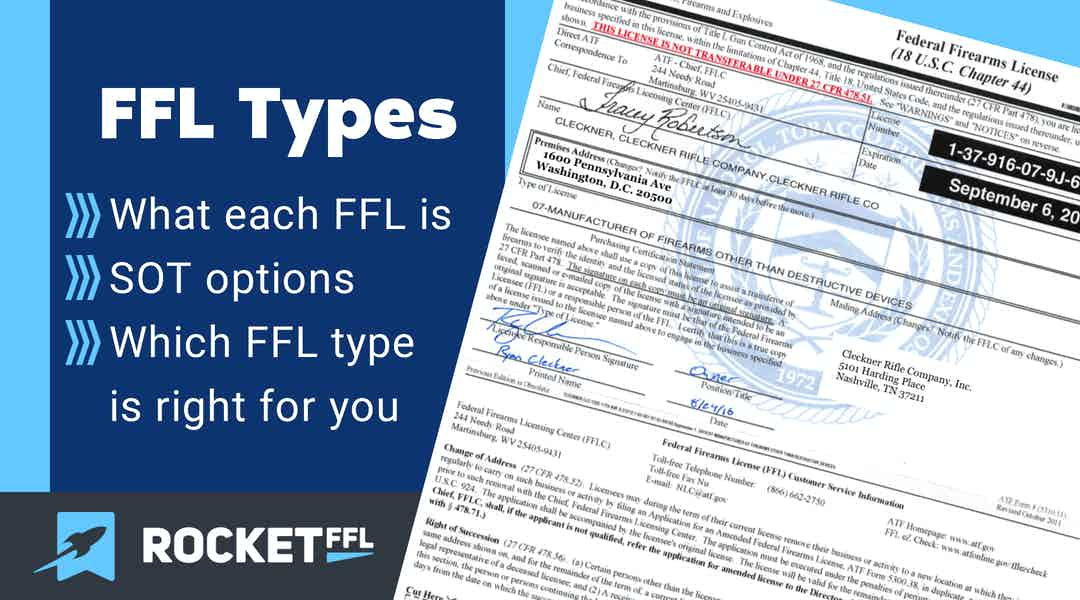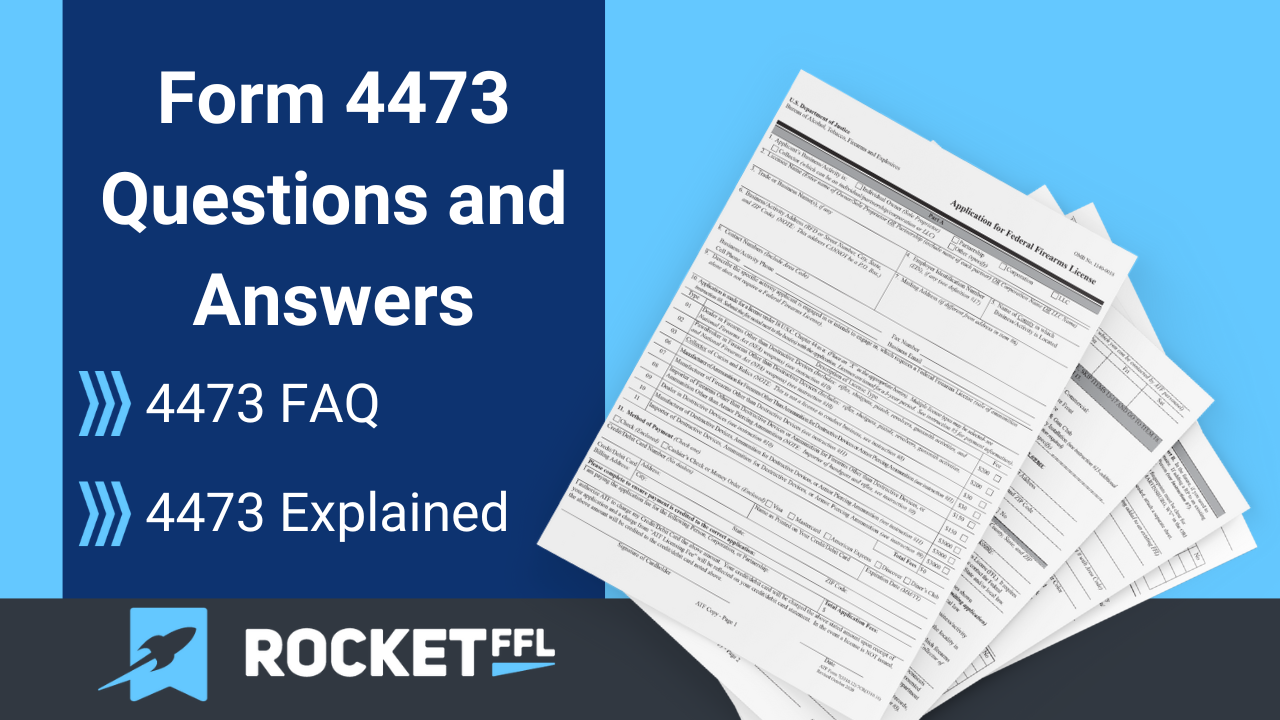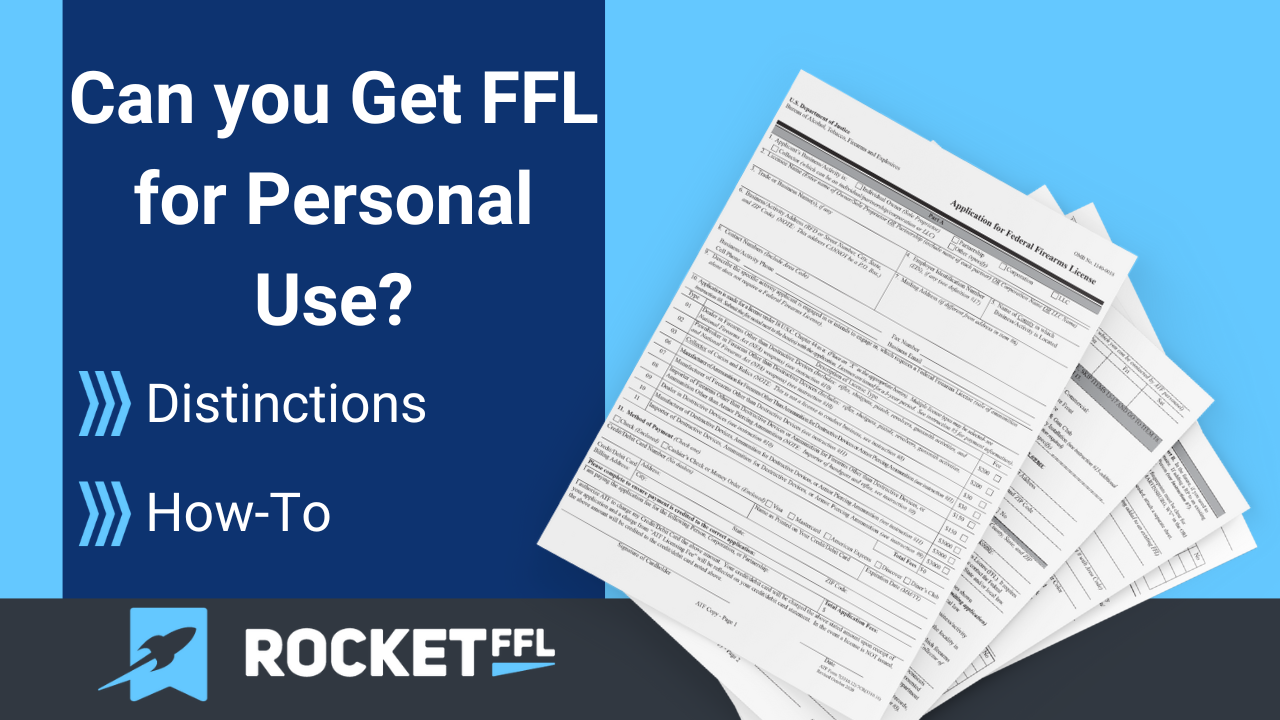There a different types of FFL to choose from. Make sure you understand which FFL type is best for you.

Prohibited Persons / Firearm Possession [2025]
Under federal law, “Prohibited persons” may not possess firearms or ammunition. It is also unlawful to knowingly give a prohibited person firearms or ammunition.
Those restrictions may seem straight-forward, but there are unique definitions and exceptions that apply to both – for example, what exactly makes a person “prohibited” and what technically counts as firearms or ammunition?
These details should be understood so that you know exactly who is a prohibited person and precisely what they are prohibited from possessing.
Who is a Prohibited Person?
The definition of who is a prohibited person includes many categories of people. The definition of a “prohibited person” is included below. Some categories, like “felons,” are simple. If someone is a felon, then they are prohibited from possessing firearms or ammunition. Other categories, however, aren’t so clear and have specific details which are included below.
Prohibited Person Definition
A “prohibited person” is anyone who [1]:
- Is a felon,
- has been convicted of any crime punishable by more than a year in prison (whether they were ever sentenced to or served a day in prison or not),
- is under indictment for any crime punishable by more than a year in prison,
- is a fugitive,
- is an unlawful user of any controlled substance,
- has been adjudicated as a mental defective,
- has been committed to a mental institution,
- is an illegal alien,
- has a dishonorable discharge from the military,
- has renounced their U.S. citizenship,
- is the subject of a restraining order restraining the person from harassing, stalking, or threatening an intimate partner or the child of an intimate partner, or
- who has been convicted of a misdemeanor crime of domestic violence.
Domestic Violence / Restraining Orders
Most of the questions I receive about firearm possession by prohibited persons concern restraining orders or domestic violence charges. Unfortunately, some people have restraining orders against them even though they’ve never done anything wrong. If the restraining order is to prevent the harassment, stalking, or threatening of an intimate partner or their child, then the subject of the restraining order is a prohibited person and may not possess firearms while the restraining order is in effect. It is important to note that an “intimate partner” does not need to be from a long-term relationship. Also, if there has been any conviction based on domestic violence, then the convicted person may not possess firearms. To see a detailed definition of what is considered a misdemeanor crime of domestic violence, and exceptions to the prohibition, see the ATF’s guide on the topic: Misdemeanor Crimes of Domestic Violence & Federal Firearms Prohibitions.
Felons / Misdemeanors Punishable by Over a Year in Prison
Generally, crimes punishable by over a year in prison are felonies. All felons are prohibited persons. However, there are some misdemeanors that can have a punishment over a year in prison – especially repeat offenses.
This can be tricky.
For example, if a person has been convicted of a misdemeanor that has a listed punishment of 1 – 14 months in prison and the person’s sentence didn’t include any jail time, then they are still a prohibited person because they were convicted of a crime that was punishable (regardless if they received the punishment) by over a year in prison.
It gets more complicated: if the crime is a state crime, then anything up to two years is ok. That’s right, the law specifically reads “The term ‘crime punishable by imprisonment for a term exceeding one year’ does not include… any State offense classified by the laws of the State as a misdemeanor and punishable by a term of imprisonment of two years or less.” Also, the restriction on an indictment (vs a conviction) only applies to transferring a gun to such a person – there is not an outright possession ban for indictments.
Unlawful User of a Controlled Substance
With the recent legalization/decriminalization of marijuana in some states, the use of a controlled substance part of the prohibited person definition is going to become a bigger issue. Remember, just because your state may allow you to smoke marijuana, the federal government doesn’t (yet). Use of marijuana, although not unlawful at the state level, may still make you a prohibited person. Be careful.
What Items are Prohibited?
Firearms / Guns
It is important to note that this is the federal definition only – some states have stricter definitions on what firearms are and who is prohibited from possessing them. The basic definition of a firearm is: “any weapon (including a starter gun) which will or is designed to or may readily be converted to expel a projectile by the action of an explosive.”[2]. In simpler terms, this means that if a projectile (bullet) is shot out of it because of an explosion (gunpowder), then the object is a firearm.
It is not just the complete gun that counts as a firearm – the frame or receiver (or any object that can be readily converted into a frame or receiver) is also considered to be a firearm, even though it can’t fire a projectile by itself. Be careful here – this means that certain parts of a gun are treated as if they were complete firearms / guns.
Also, silencers and “destructive devices” (grenades, explosive projectiles, etc.) are included in the federal definition of a firearm. These additional parts of the definition aren’t worth discussing in this guide, however, because if you are not permitted to possess a shotgun, you clearly aren’t allowed to possess silencers and grenades.
There are some exceptions to this definition. For example, black powder / muzzle-loading firearms aren’t technically “firearms” within the definition of federal law because they are exempted as “antique” firearms even though they may have been manufactured yesterday. Air rifles (pellet guns, BB guns, etc.) are not firearms under federal law because they fire a projectile with compressed air and not an explosion. Be careful with air rifles – some states define them as firearms.
Ammunition
The term “‘ammunition’ means ammunition or cartridge cases, primers, bullets, or propellant powder designed for use in any firearm.”[3] This means that every part of a cartridge of ammunition is considered “ammunition.” Therefore, if a prohibited person is in possession of just an empty shell casing, then they can be in trouble. This is a likely area for trouble. A prohibited person likely knows to get rid of their guns, but they may forget to get rid of all of their ammunition as well.
What to Do if You’re a Prohibited Person
If you are a prohibited person, stay away from firearms for as long as you remain a prohibited person. Possession of a firearm is enough to get you into trouble – it doesn’t have to be your firearm. Also, be extremely careful near firearms, even if you’re not physically holding one.
Depending on the situation, having access to a nearby firearm might be enough to get you into trouble. If you want to regain your right to possess a firearm, you should contact an attorney in the state where the event happened that keeps you from possessing firearms. You may be able to overturn your status as a prohibited person. It is rare, but it can happen.
Whatever you do, do NOT try to have someone else get a firearm or ammunition for you. This is a straw purchase and will get you BOTH in serious trouble.
Prohibited Person FAQ
A prohibited person is a special class of people who may not possess firearms nor ammunition.
No, prohibited persons can not get an FFL.
If you’re a prohibited person and you don’t think that you should be, you can fight the issue. Depending on whether it is a state issue or a federal issue, you can find a lawyer to help try and remove the problem or restore your rights.
No, you may not buy a gun for a prohibited person. This is a serious crime. If you have reason to believe that someone is a prohibited person, you may not allow them access to firearms nor ammunition.
You must be 21 years of age or older to get an FFL.
What’s wrong with apostrophes in this FAQ block? Let’s find out.
Recommended Posts
18 thoughts on “Prohibited Persons / Firearm Possession [2025]”
Leave a comment




i have a question i was involved in a major motorcycle accident 6 yrs ago i died 3 times that day and months in the hospital 7 surgeries any way i end up have ptsd and i went to a mental hospital and admitted myself i am completely done with therapy and off all meds for that i am able to apply for my fid card in august if i apply for a ffl would i be able to get it i have 2 ccw and can carry in 34 states my first thing is getting my fid but after that will i have any trouble getting the ffl
You’ll only be prevented from getting an FFL (or possessing firearms and ammunition) if you are a prohibited person. Please review our article on prohibited persons.
Hey guys, i had a restraining order from a ex and was arrested for family violence. Well after 2 years fighting it i was able to find a old phone and show them the text that proved i didnt do anything, but even tho all charges where dropped they told me the restraining order was a civil matter and could not be lifted being anyone can get one against anyone and id have to wait till it expired and that they wasnt sure if id get my rights back or if i was banned for life. Well it has been expired for almost 2 years now but no one know whether or not i get my rights back, i sold all my guns the day i was ordered to not get in trouble but the sheriff told me i should of just put them in my mothers home but i didnt want to get in trouble so just sold them to a local gun shop. Being the order has expired and i have the proof and court records that i didnt do anything are my right put back into effect or do i have to go to court to reinstate them? Everyone just says go try to buy one but its honestly embarrassing and id hate to fail and look like a criminal when i proved i did not do anything!! Also i live in south texas. Thank yall
Hey Patrick! We can’t provide specific answers regarding your situation however I can point you in the direction of a couple resources from Ryan which should help. Trigger Words Podcast – Episode #4 / Prohibited Persons & a RocketFFL article he wrote – “Prohibited Persons / Firearm Possession“. Hopefully this helps!
Is a prohibited person with a firearm concidered a violent crime?
Not possession alone, no.
Can a prohibited person still sell firearms in a gun store?
A prohibited person can not even legally possess/touch/have access to firearms. In this case, the prohibited person should immediately give/sell the firearms to someone who is allowed to possess them and that person can sell them.
I had a POCS that was a deferred adjudication back in 2002 that I completed successfully, does that prohibit me from owning or purchasing a firearm now?
Maybe – you’ll need to contact a lawyer in your state to confirm.